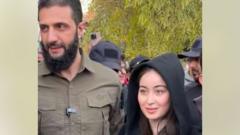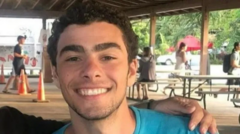Romania's domestic intelligence has disclosed revelations suggesting a significant foreign interference operation targeting the country’s presidential elections, utilizing TikTok for dissemination. The activities allegedly favor far-right candidate Calin Georgescu, who has gained unexpected traction following reported coordinated campaigns. This revelation comes alongside Russia's identification of Romania as a priority target in its hybrid warfare strategy.
Romania's Presidential Election Faces Foreign Disruption Amid TikTok Manipulation and Cyber Threats

Romania's Presidential Election Faces Foreign Disruption Amid TikTok Manipulation and Cyber Threats
Authorities unveil a coordinated social media campaign aimed at influencing the presidential elections, allegedly linked to Russian actors amid rising geopolitical tensions.
Romania's domestic intelligence service has disclosed that the nation's upcoming presidential elections have been significantly affected by a well-planned foreign interference operation. Authorities reported that social media platform TikTok is being used strategically alongside a series of cyber-attacks, suggesting involvement from a state-sponsored actor.
Calin Georgescu, a far-right candidate and noted commentator on geopolitical issues, has gained unexpected recognition, advancing from obscurity to leading in the first round of presidential elections held two weeks ago. Intelligence assessments link his rise to a highly organized social media campaign conducted from external locations, designed to circumvent oversight and promote anti-NATO sentiment.
The intelligence documents, made public by outgoing president Klaus Iohannis, indicate that the campaign comprised paid TikTok promotions for Georgescu, violating both the platform's policies and Romanian electoral law which mandates transparency in political advertising. According to intelligence reports, one TikTok account funneled approximately $381,000 to influencers supporting Georgescu within just one month—despite the candidate's assertions that he has made no financial expenditure for promotion.
The intelligence also revealed an alarming increase in cyber activities, with around 85,000 attempted hacks aimed at electoral data and processes, originating from sources believed to be linked to Russia. These intrusions are characterized as typical of orchestrated efforts by state-sponsored actors.
Georgescu has publicly claimed the intelligence leaks are a coordinated effort to sabotage his candidacy, insisting he has no ties to the purported funders or influencers. The documents released were initially compiled for a security council meeting focused on the electoral situation following the recent voting round.
Romanian officials have expressed concern over the implications of these findings, particularly as the next stage of voting approaches. Prime Minister Marcel Ciolacu, who finished third in the first round, has declared his support for reformist candidate Elena Lasconi while demanding accountability for those responsible for the disruptions.
Calls for a pro-EU protest are scheduled in reaction to the unfolding situation. Georgescu, meanwhile, cautioned against unrest, invoking memories of Ukraine's Maidan protests, and called for calm among his supporters. With the election facing scrutiny, the prosecutor’s office is now investigating the validity of the claims, marking a critical moment in Romania's electoral integrity.



















